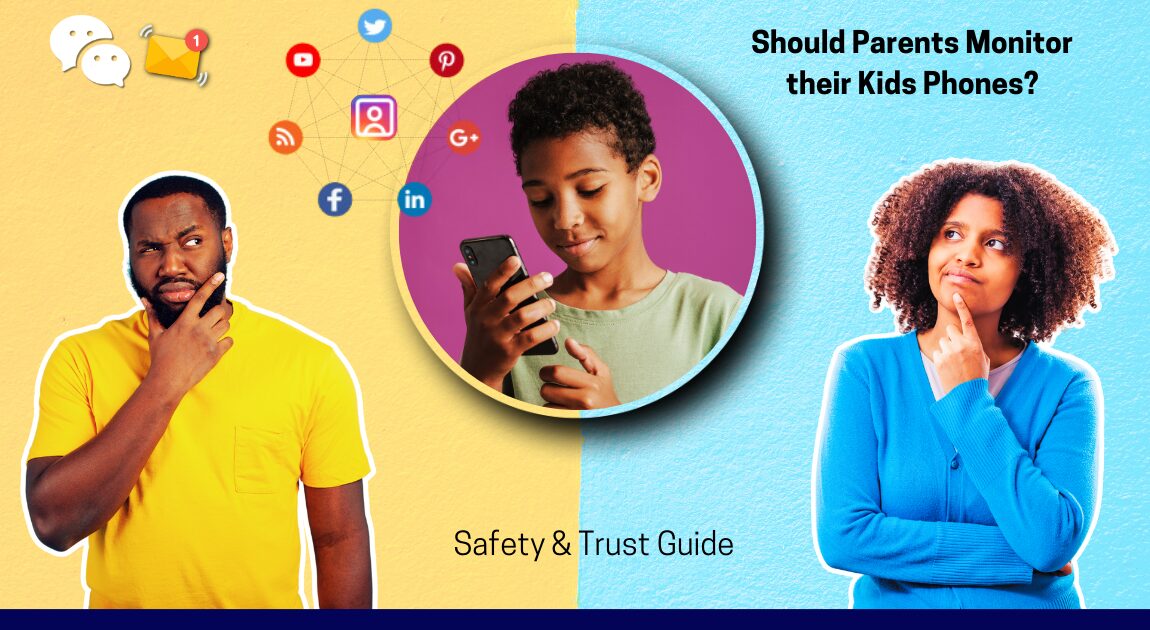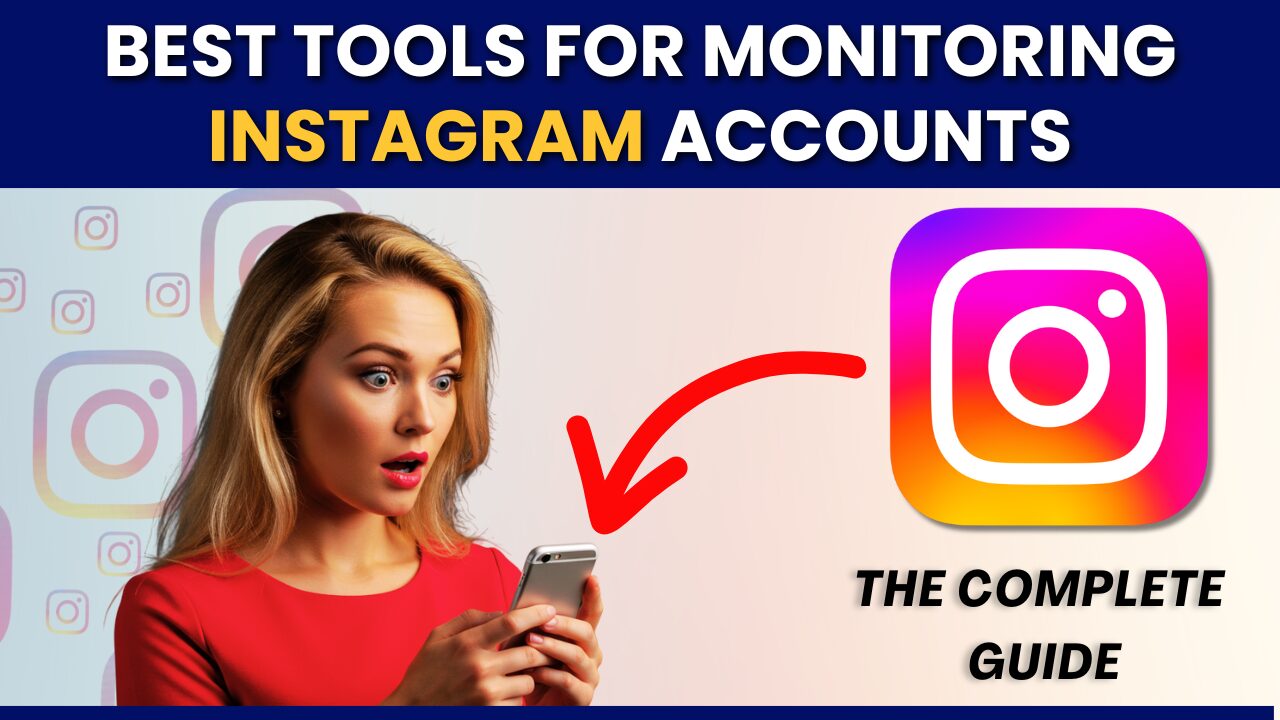In our digital age, the question of whether parents should monitor their kids’ phone use has become increasingly pertinent. With the proliferation of smartphones and mobile phones, children are more connected than ever, often using these devices for communication, entertainment, and education.
However, with this connectivity comes a range of potential risks that can impact a child’s well-being. Parents are thus confronted with the challenge of ensuring their children’s safety while respecting their privacy.
This article explores the reasons for monitoring, the tools available for parental control, the ethical considerations involved, and the impact of monitoring on parent-kid relationships.
Why Should Parents Monitor Their Kids’ Phone Use?
What are the potential risks of unmonitored phone use?
Unmonitored phone use can expose children to numerous risks, including exposure to inappropriate content, cyberbullying, and online predators.
Children may inadvertently access harmful websites or become targets of cyberbullying through text messages and social media platforms. Furthermore, the anonymity of the internet can make it easier for predators to engage with unsuspecting kids.
Monitoring your child’s phone can help mitigate these risks by allowing parents to check their child’s phone for suspicious activity and intervene when necessary.
How does monitoring help in ensuring kids’ safety online?
Monitoring a child’s phone is important for ensuring their safety online. By keeping track of their child’s phone use, parents can identify potential hazards and address them proactively.
This involves not only looking through their child’s phone to understand their online interactions but also educating them about safe internet practices.
Parental monitoring apps can alert parents to dangerous content or contacts, thereby enabling timely intervention.
Moreover, discussing these issues openly with children can foster awareness and encourage responsible phone use.
What age should parents start monitoring their kid’s phone?
The age at which parents should begin monitoring their kid’s phone varies, but many experts suggest starting as soon as children begin using their own smartphones or mobile phones.
Younger children, who are less experienced in navigating the digital world, may require closer supervision. However, as children grow older, the need for monitoring should be balanced with increasing trust and independence.
This gradual transition helps children learn to take responsibility for their phone use while still having parental guidance available when needed.
What Tools are Available for Parental Monitoring?
Which parental control apps are most effective?
Several parental control apps are available to assist parents in monitoring their children’s phones. Some of the most effective apps include:
- mSpy: Tracks messages, calls, and social media apps discreetly.
- Parentaler: Alerts parents about potential issues without invading privacy entirely.
- Moniterro: Allows parents to manage app installations and screen time.
- Eyezy: Built-in for iOS users to set app limits and monitor usage.
These apps offer a range of features such as activity monitoring, screen time management, and content filtering. They allow parents to monitor their children’s devices remotely and receive alerts for any flagged activities.
The effectiveness of these apps largely depends on the specific needs and preferences of the family, as well as the age and maturity of the child.
What features should a good parental monitoring app have?
A good parental monitoring app should have several key features to ensure comprehensive oversight. These include real-time location tracking, web content filtering, app usage monitoring, and the ability to view text messages and social media interactions.
Additionally, a user-friendly interface and customizable settings are essential for tailoring the app’s functionality to the family’s needs. Parents should also look for apps that provide regular updates and customer support to address any technical issues that may arise.
Are there any free parental control tools available?
Yes, there are several free parental control tools available that can help parents monitor their children’s phones. While these tools may not offer the full range of features found in paid apps, they can still provide basic monitoring capabilities.
For example, Google Family Link and Apple’s Screen Time are built-in options that allow parents to set screen time limits and monitor app usage. These tools can be a cost-effective way to begin monitoring your child’s phone and establish digital boundaries.
How Can Parents Respect Their Kids’ Privacy While Monitoring?

What are the ethical considerations in parental monitoring?
The ethical considerations in parental monitoring revolve around balancing the need for safety with respecting a child’s privacy. While it is important to ensure children’s safety, invading their privacy can lead to mistrust and resentment.
Parents should be transparent about their monitoring practices and involve their children in discussions about safety and privacy. This approach fosters a sense of mutual respect and understanding, ensuring that children feel their rights are being considered even as parents monitor their children’s phones.
How can parents have open conversations about phone monitoring?
Open conversations are important for maintaining trust between parents and children when it comes to phone monitoring. Parents should explain the reasons for monitoring and how it helps ensure safety.
Encouraging children to express their concerns and opinions about monitoring can lead to a more cooperative approach.
By discussing the potential risks and benefits of phone use, parents can help their children understand the importance of monitoring and develop their own strategies for responsible device usage.
What boundaries should parents set while monitoring?
Setting clear boundaries is essential when parents monitor their children’s phones. These boundaries should be based on mutual agreements and take into consideration the child’s age and maturity level.
Parents should focus on monitoring activities that pose the greatest risk, such as social media interactions and unknown contacts, rather than invading every aspect of the child’s digital life.
Establishing boundaries helps cultivate a trusting relationship, allowing children to feel secure and respected.
How Can Parents Effectively Monitor Without Being Overbearing?
What strategies can parents use to balance monitoring and trust?
Balancing monitoring and trust requires a thoughtful approach. Parents can establish trust by involving children in setting monitoring guidelines and gradually reducing oversight as kids demonstrate responsible phone use.
Consistent communication and positive reinforcement can also strengthen trust. Instead of focusing solely on restrictions, parents should emphasize the educational aspects of monitoring, teaching children how to navigate the digital world safely and responsibly.
How can parents educate kids about responsible phone use?
Educating kids about responsible phone use is a critical component of effective parental monitoring. Parents should discuss the potential risks associated with phone use, including privacy concerns and the importance of protecting personal information.
Encouraging children to think critically about the content they encounter and the people they interact with online is essential. By modeling responsible phone behavior and setting clear expectations, parents can guide their children toward making informed decisions about their digital interactions.
What are some signs that a parent is being too controlling?
Signs that a parent may be too controlling include excessive checking of the child’s phone, unrealistic restrictions on phone use, and a lack of trust in the child’s ability to make decisions.
Overbearing behavior can lead to secrecy, resentment, and a breakdown in communication between parent and child.
Parents should be mindful of their monitoring practices and ensure they are not infringing on their child’s privacy or autonomy. Striking a balance between oversight and independence is key to maintaining a healthy relationship.
What Impact Does Parental Monitoring Have on Parent-Kid Relationships?

How does monitoring affect trust between parents and kids?
Parental monitoring can have a significant impact on the trust between parents and kids. When done transparently and respectfully, monitoring can enhance trust by demonstrating a commitment to the child’s safety and well-being.
However, overly intrusive monitoring can erode trust and lead to feelings of betrayal. Parents should strive to build trust by being open about their monitoring practices and involving their children in discussions about digital safety.
What are the benefits of mutual understanding in phone use?
Mutual understanding in phone use can strengthen the parent-kid relationship by fostering open communication and shared goals.
When parents and children work together to establish guidelines for phone use, it creates a collaborative environment where both parties feel heard and respected.
This mutual understanding can lead to greater compliance with monitoring practices and a more harmonious relationship, as children appreciate the support and guidance offered by their parents.
How can parents foster a supportive environment for phone use?
Parents can foster a supportive environment for phone use by encouraging open dialogue, setting realistic expectations, and providing guidance without being overly restrictive.
By focusing on education and communication, parents can help children navigate the digital world confidently and safely. Praising responsible behavior and discussing challenges openly can reinforce positive phone use habits and strengthen the parent-child bond.
Ultimately, a supportive environment empowers children to make informed choices while feeling secure in their parents’ guidance.
Conclusion
The question of whether parents should monitor their kids’ phones doesn’t have a one-size-fits-all answer. While monitoring can ensure safety, it should be done responsibly, with respect for privacy and trust.
Parents should weigh the benefits of monitoring against the risks of damaging relationships or fostering rebellion. Ultimately, the goal is to guide children toward safe and responsible phone usage.
With education, communication, and the right tools, parents can protect their kids while allowing them the freedom to grow and learn in the digital world.





